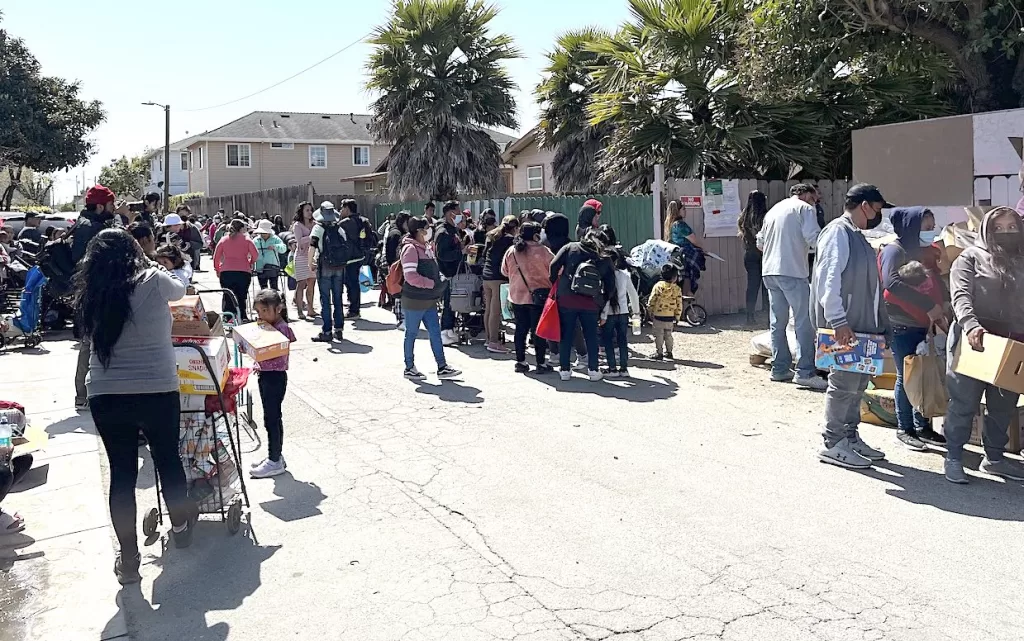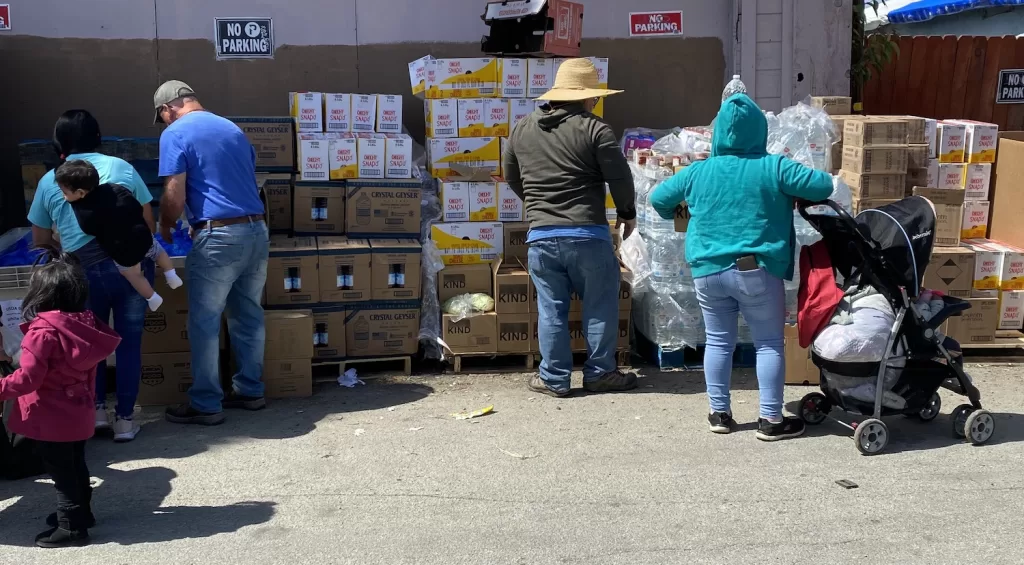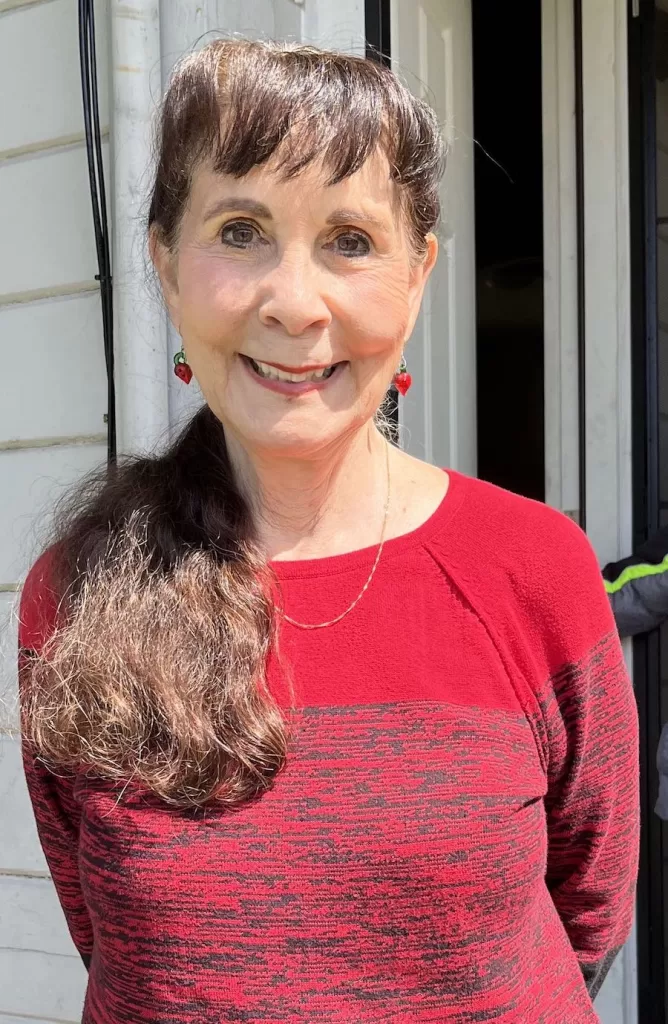
Editor’s note: In mid-April, during a visit to Watsonville, California, the People’s Tribune interviewed Dr. Ann Lopez, PhD, founder and executive director of the Center for Farmworker Families (CFF). The CFF works on California’s central coast to promote awareness about the difficult lives of binational farmworker families and to help improve their lives. We visited with Dr. Lopez during a monthly distribution of food, clothes and household goods in Watsonville that is organized by the CFF and other non-profit groups and volunteers. The demand for donated essentials has skyrocketed in the area in the wake of the storms in Pajaro, California (a farmworker community on the southern edge of Watsonville) that flooded fields and hundreds of homes in March, forcing thousands to evacuate. Many Pajaro farmworkers have been left jobless and homeless. Below are excerpts from the interview.
People’s Tribune: Can you tell me about the nature of this distribution that you do here? How long have you been doing this?
Ann Lopez: Well, about three years ago, I visited a Oaxacan family in February. It had been a very rainy year, and they had two young daughters who were crying continuously and begging for food, and the parents just ignored them while I was talking with them. And finally I just stopped the conversation and I said give them some food. And the parents looked so ashamed, and they looked down at the ground. And I will never forget, in their refrigerator they had one head of lettuce, a third of a gallon of milk, and two jello cups, and that was the only food in the house. And I said, where’s your food? And they said, we’re not working, we have no money for food, so we’re all hungry. And I said, is this true of just your family or the whole community? They said, no, the whole community’s hungry. So I called the food bank, and that afternoon they brought out food for 144 families. It was very impressive. And from then on, since we knew there was hunger in the community during the winter, we established a partnership. And so once a month, on the second Friday of the month, we do this distribution. That’s where it came from. And it grew from just food to clothes, household goods, whatever’s needed, so people don’t have to feel deprived. This one today and one we had two months ago are the biggest we’ve had. We usually get a maximum of, I’d say, 300 families at this time of year. And this one today probably is close to 600 or 700 families. And the one two months ago was the same. So that’s related to the Pajaro floods and people losing everything and just not having anything anymore.

PT: And can you talk about the impact of the floods on the community here?

AL: It’s been absolutely devastating. Absolutely devastating. And quite frankly, it makes me very angry because they knew these levees needed to be redone in 1995. And they just chose not to do it until, I think they planned it for 2025. And on the Watsonville side of the levee, they spent five times more money shoring up the levees than on the Monterey side of the levees, and that’s why they didn’t break in Watsonville, but they broke on the Monterey side [flooding Pajaro]. And I think there should be some liability or accountability, something for these people who literally had nothing and now they have even less. I mean, it’s even worse than that. I’ll never forget the story of the poor man who worked 14 years to furnish a house for his family in Pajaro, and then after the floods, all of it was destroyed, and he was walking around just sobbing randomly. It’s the cruelest thing. And it fits in with just our attitude about farmworkers in general. Somehow farmworkers are not viewed as worthy human beings, worthy of dignity, respect, the same kind of care anybody else would get. Environmental and social racism are rampant in the farmworker community. And that’s exactly what we had here. It’s tragic. I had heard that FEMA will pay the rent and help people find a new place and, you know, provide all these great services. And then I just talked to a young man who said he went to the FEMA office, and they’re not helping them with rent. He was asking me for rent. So whatever their service is, it’s not that helpful from what I’m hearing, which is really too bad.
PT: Are a lot of the folks in this area undocumented?
AL: Oh yes. In fact, I’ve heard a figure as high as 83% [are undocumented]. I have never met a Oaxacan farmworker with papers. And this is too bad, because anybody who works weeks, months and years in the field should not have to worry about deportation. What would we do without them? They’re the basis of our food source. We should unburden them from that fear. The fear of having their families torn apart and being deported is one of the worst to live with for them.
PT: And I’m assuming that if you’re undocumented, you probably can’t get any help from the government?
AL: Not really. The people that have really made a difference for the evacuees are the small nonprofits like ourselves. I mean the government has been pretty much useless. I’ve not talked to anybody who’s gotten help from the government, either municipal, state or federal. Why are we paying these people’s [government] salaries, you know? I’m sorry, but that’s how I feel about it.
PT: And the people who come here to volunteer and who donate things and so on, are those non-profit groups or a mix of groups and individuals?
AL: Yes, and it’s interesting. It’s quite remarkable to me because we set up from 1 to 2 p.m., and people show up and the tables go up and everything gets organized, and it just happens. I mean, it’s not like I have to get out and be a dictator. It just happens, you know, which I thought was terrific. And it seems to give people a common focus around which to express themselves and their energy and so on. So I think it’s a positive thing in that way, as well as helping the migrants.
PT: And could you talk a little bit about the Center for Farmworker Families and what it does?
AL: Well, our goal is to inform the public of the harsh circumstances that farmworkers live in. Most of the public is just not aware. I do farmworker reality tours where I take people or groups out to meet farmworkers and hear their stories. And by the end of the day, you know, people are just staring at a wall. They had no idea. And so I think people need to know where our food comes from and what the labor situation is, because that’s the only way it’s going to change. There’s three things that would transform farmworkers’ lives, and the first of course is comprehensive immigration reform. Give these people legal status that are working for us for no money, number one. And number two, they need a living wage. They should not have to depend on charity when they work so hard, and they’re so essential. There’s nothing more essential to a society than its food source. So why are these people at the bottom of the barrel? Is it because they’re brown? I mean, one has to ask these questions. You know, a Silicon Valley executive making a six-digit salary is completely dependent on their work. So why aren’t they getting the remuneration that they deserve? And finally, they need a contract with the grower they work for, because 22.5% of wages are stolen. So here they go to work for a week or two for a grower, and then the grower doesn’t pay them, and says if you don’t leave, I’ll blacklist you or send you back to Mexico. These things have got to be reformed. And recently I got a call from a woman at a farm, I think it was one of Driscoll’s farms, and she was sobbing and sobbing. I said, what happened? She said I’ve just been sexually assaulted in the field. And it turns out from a Southern Poverty Law Center study and UC Davis, 60 to 80% of farmworker women are either sexually harassed, groped, or outright raped in the field, and there’s no oversight. There’s no accountability. There’s nothing she can do. And there’s laws on the books that say you have to let farmworkers go if the heat gets to a certain level. But then I had people in the field calling me saying it’s 101 to 108 in the field and people are fainting and our supervisor won’t let us go. So, I mean, this kind of thing where it’s a blatant breaking of laws and disregard again for these people as human beings, when is this going to change?
PT: If people wanted to either help the Center or help with this distribution here, how could they they go about doing that?
AL: There’s a link on our website, farmworkerfamily.org, called Squarespace, where they can write what they’re interested in volunteering for. And then I’ll get the email and contact them and we’ll go from there.
PT: Is there anything more you wanted to add that I haven’t covered?
AL: We need to change the entire industrial agricultural system. It’s not working. The only person or the only entity it’s working for are the agrichemical companies and wealthy growers, but farmworkers certainly don’t win in it. Even growers, given the global neoliberal economy, if they start growing strawberries cheaper in Taiwan than they do here, Taiwan can send strawberries here, undercut the market and put growers out of business. The environment is suffering terribly from all the pesticides. And then you and I are suffering terribly as well, simply because we don’t know what’s in our food, even if it’s organic. I mean, pesticides can drift. Telone is a registered carcinogen used all through this area. It drifts seven miles. And 80% of Americans, according to the CDC, have Roundup in our urine. I don’t want this in my urine. I mean, it causes non-Hodgkin’s lymphoma. This is disgraceful. How do they get away with this? So we need reform on all sectors, on all levels of the agricultural system.
Bob Lee is a professional journalist, writer and editor, and is co-editor of the People’s Tribune, serving as Managing Editor. He first started writing for and distributing the People’s Tribune in 1980, and joined the editorial board in 1987.


Excellent article! So informative. Most people have no idea about the absolutely inhumane living and working conditions of agricultural workers, who have been abused for generations.